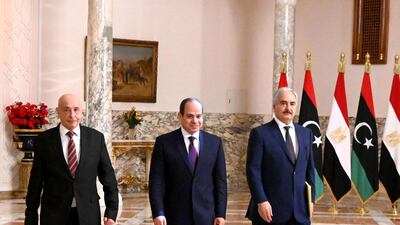US President Donald Trump spoke to Egyptian President Abdel Fattah El Sisi on Wednesday and praised his efforts to promote political reconciliation in Libya, the White House said.
The two leaders discussed ways to resume the UN ceasefire talks and hasten the departure of all foreign forces from Libya.
The call comes days after Cairo launched a new bid to end fighting after a dramatic escalation on the ground in recent weeks following over a year of near stalemate.
Mr El Sisi on Saturday laid out a roadmap starting with a ceasefire from last Monday and a return to UN-mediated talks. The initiative has been backed by Russia and the UAE.
“The Egyptian initiative on Libya has become central to Arab and international political action to restore stability to this sister country and we continue our efforts with Cairo to seek an immediate ceasefire and activate the political track,” UAE Minister of State for Foreign Affairs, Dr Anwar Gargash, tweeted on Thursday. “The military decision [is] that Ankara wants to prolong the suffering of the Libyans and violates the international consensus,” he added in reference to Turkey’s refusal to back the Cairo initiative and press ahead with offensives on the ground despite the ceasefire offer from Monday.

UAE Minister of Foreign Affairs and International Cooperation Sheikh Abdullah bin Zayed also discussed the situation in Libya with his Greek counterpart Nikos Dendias, the state-run WAM news agency reported.
In a separate conversation, Mr Trump discussed Libya in a call on Monday with Turkish President Recep Tayyip Erdogan, who said the two agreed on "some issues."
Russian President Vladimir Putin spoke with Mr Erdogan on Wednesday regarding both Libya and the situation in Syria’s Idlib where Ankara backs rebel groups fighting the Moscow-supported Syrian regime.
Mr Putin's call came a day after he spoke with German Chancellor Angela Merkel, who has been facilitating European and UN-mediated talks, and the pair expressed their concern over an escalation of fighting in Libya.
On Wednesday, the United Nations Support Mission in Libya (UNSMIL) said Libya’s warring sides were “fully” engaged in military talks aimed at ending the fighting in the country’s west, calling the virtual meetings “productive”.
UNSMIL said it convened a meeting with a delegation from Field Marshal Khalifa Haftar’s eastern-based LNA on June 3 and another meeting on Tuesday with a delegation from the GNA in Tripoli.

“Both meetings – which were conducted virtually – were productive and enabled UNSMIL to discuss with the delegations the latest developments on the ground,” the mission said.
US Secretary of State Mike Pompeo on Wednesday welcomed the resumption of talks led by the United Nations between the Government of National Accord based in Tripoli and the Libyan National Army based in the east.
"The agreement between the GNA and LNA to re-enter UN security talks was a good first step, very positive," Mr Pompeo said. "Quick and good-faith negotiations are now required to implement a ceasefire and relaunch the UN-led intra-Libyan political talks.”
Over the past couple of weeks, Libya’s conflict has taken a new turn. In a series of rapid gains backed by extensive Turkish air and ground support, the GNA has suddenly brought most of northwest Libya back under its control and dashed the LNA’s bid to unite the country and end the rule of the militias that fight for the Tripoli administration.
While the United States has said it opposes Field Marshal Haftar's offensive, it has not thrown its support behind the GNA. It has also lambasted Russian involvement, a stance reiterated on Wednesday by Mr Pompeo.
German Foreign Minister Heiko Maas said his country, which hosted the January conference in Berlin, was "extremely concerned" by the hostilities and welcomed the latest push to end them.
In recent days, two of Libya’s biggest oil fields have been shut down again by gunmen, dashing hopes the war-torn country might revive its energy industry after a five-month halt.
The Sharara field, the nation’s largest, and the El Feel deposit are offline again following incursions by armed groups. Their short-lived re-opening underscores Libya’s unpredictability as an oil supplier and the fragility of a nascent resumption of exports. The nation has produced little crude since January amid a civil war that has blocked or shut down almost all of its oil ports and fields.
Libya’s National Oil Corporation said on Wednesday that an armed group had forced workers at the El Feel field – run by a joint venture with Italy’s Eni SpA – to stop production, only a few days after it had restarted operations. On Monday, the nearby Sharara site was also stormed by gunmen and forced to halt twice.
The moves prompted the state-run NOC to reinstate an export ban it had lifted earlier this week at the two deposits, declaring force majeure on loadings.

